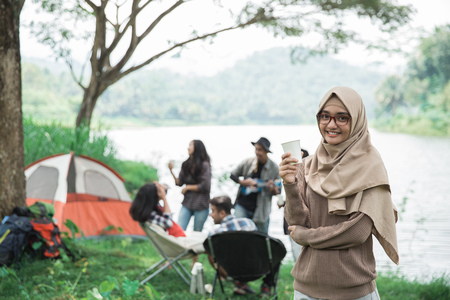Introduction to Glamping and Social Media
Over the past decade, glamping has taken the outdoor world by storm. Short for “glamorous camping,” glamping blends the beauty of nature with the comfort and luxury of a hotel stay. Think cozy beds inside safari tents, treehouses with private hot tubs, or yurts equipped with Wi-Fi and air conditioning. It’s a far cry from traditional camping, where roughing it was part of the experience.
In the United States, glamping has grown from a niche idea into a booming industry. As more people seek unique travel experiences that don’t sacrifice comfort, glamping offers an ideal solution. Whether its families wanting a hassle-free getaway or couples looking for a romantic escape under the stars, glamping fits the bill.
One major force behind this surge in popularity? Social media. Platforms like Instagram, TikTok, Pinterest, and YouTube have played a huge role in turning glamping into a must-try trend. A single photo of a beautifully lit tent at sunset can go viral and inspire thousands to book their own luxury outdoor retreat.
How Social Media Fuels Glampings Popularity
Social media has changed how people discover and choose travel experiences. With visually driven platforms leading the way, users are constantly exposed to stunning images and videos of glampsites across the U.S.—from mountaintop domes in Colorado to beachfront bell tents in California.
Here’s how social media contributes to glampings growth:
Social Media Feature |
Impact on Glamping |
|---|---|
Instagram-worthy visuals |
Beautiful photos of stylish tents and scenic views attract travelers looking for unique stays. |
User-generated content |
Guests sharing their own glamping experiences create free promotion for hosts and brands. |
Influencer marketing |
Travel influencers often partner with glampsites to showcase experiences, reaching large audiences. |
Hashtags & location tags |
Easier discovery of new glamping destinations through tagged posts and trending hashtags like #glampingUSA. |
Short-form video content |
Platforms like TikTok make it easy to share immersive tours or day-in-the-life clips from glampsites. |
The visual appeal of glamping is tailor-made for social media. The more people see these beautiful spaces online, the more they want to try them themselves. It’s no longer just about camping—it’s about creating memorable moments that look great on your feed.
2. Instagram-worthy Aesthetics and Visual Appeal
In today’s digital age, looks matter—especially when it comes to glamping. One of the biggest reasons glamping has exploded in popularity is because of how visually stunning these sites can be. With unique tents, cozy fire pits, fairy lights, and mountain backdrops, glampsites are designed to be “Instagram-worthy.” This means they’re perfect for taking beautiful photos that people want to share on social media.
The Power of Shareable Content
Platforms like Instagram, Pinterest, and TikTok thrive on eye-catching visuals. When someone posts a dreamy photo or video of their glamping getaway, it sparks curiosity and desire in others. These platforms turn guests into unofficial brand ambassadors, promoting glampsites simply by sharing their experiences online.
How Social Media Drives Glamping Interest
| Platform | Main Feature | How It Boosts Glamping Popularity |
|---|---|---|
| Photo & Story Sharing | High-quality images of stylish tents and scenic locations attract followers who want similar experiences. | |
| Visual Discovery & Mood Boards | Users save glamping ideas for future travel plans, spreading awareness through pins and boards. | |
| TikTok | Short-Form Videos | Creative videos showing off glamping setups go viral quickly, reaching a wide audience. |
Designing for the Camera
Many glampsite owners now design their spaces with photography in mind. From boho-chic interiors to panoramic views outside the tent flap, every detail counts. The more “post-worthy” a location is, the more likely guests will share it—and the more visibility the site gains.
User-Generated Content as Free Marketing
When guests post about their stay on social media, they’re doing free advertising for the site. One great photo or video can lead to dozens of new bookings. This user-generated content builds trust too—people tend to believe personal recommendations over ads.
The Bottom Line
A visually appealing glampsite doesn’t just create a better guest experience—it also boosts its online presence. With so many people discovering travel ideas through social media, having a photogenic setup is no longer optional; it’s essential.
![]()
3. Influencer Marketing and Brand Partnerships
One of the biggest drivers behind the rise of glamping in the U.S. is influencer marketing. Travel influencers, lifestyle bloggers, and social media personalities have played a major role in turning glamping from a niche trend into a mainstream vacation option. Their content often showcases stunning tents, cozy cabins, and scenic outdoor experiences that look both adventurous and luxurious—perfect for Instagram and TikTok.
Authentic Storytelling Makes Glamping Relatable
Unlike traditional advertisements, influencers create personal stories around their glamping trips. Whether its waking up to a mountain view or roasting marshmallows under fairy lights, these real-life moments help followers imagine themselves in similar settings. This kind of authentic storytelling builds trust with audiences and makes glamping feel accessible, even for those who aren’t typical campers.
Types of Influencers Helping Glamping Grow
| Influencer Type | Main Platforms | Impact on Glamping Popularity |
|---|---|---|
| Travel Influencers | Instagram, YouTube | Share destination reviews and showcase unique stays like yurts or treehouses |
| Lifestyle Bloggers | Instagram, Blogs, Pinterest | Create curated content around outdoor living with a luxury twist |
| Family & Couple Content Creators | TikTok, Instagram | Highlight glamping as a fun, romantic, or kid-friendly getaway option |
Brand Collaborations Boost Visibility
Many glamping brands partner directly with influencers to reach new audiences. These collaborations often include sponsored stays, discount codes, giveaways, or co-branded content. When done well, these partnerships don’t feel like ads—they blend naturally into the influencer’s usual content. For example, an influencer might share a “day in the life” video at a glamping site or offer tips on packing for a luxury camping trip.
Examples of Successful Brand Partnerships:
- A popular travel vlogger partners with a national glamping chain to document their cross-country road trip.
- A lifestyle blogger works with an eco-friendly tent company to showcase sustainable glamping options.
- A couple’s Instagram page features a sponsored weekend getaway at an upscale dome resort in Colorado.
This kind of exposure not only increases brand awareness but also helps shape public perception—making glamping look trendy, comfortable, and worth trying.
4. User-Generated Content and Community Building
One of the biggest drivers behind the rise of glamping in the U.S. is the power of user-generated content (UGC). Everyday people are sharing their glamping adventures on Instagram, TikTok, YouTube, and Facebook—showing off cozy tents, stunning views, and unique outdoor setups. These real-life stories and photos help others see what glamping is really like, making it feel more accessible and exciting.
Building Trust Through Real Experiences
When people see friends or influencers enjoying a glamping trip, they’re more likely to trust the experience. Unlike traditional ads, user posts feel authentic and relatable. They show both the highlights and the little details—like how comfy the beds are or what kind of breakfast was served. This kind of content builds trust and makes potential guests feel confident about booking their own stay.
A Sense of Belonging
Social media also helps form a tight-knit glamping community. People love to comment on each other’s posts, ask for recommendations, and share tips. Hashtags like #glampinglife, #glampusa, and #campingwithstyle connect users who might never meet in person but share a common love for luxury camping.
Popular Glamping Hashtags & Their Communities
| Hashtag | Community Type | Main Platform |
|---|---|---|
| #glampinglife | General glamping lovers | |
| #glampusa | U.S.-based travelers | TikTok |
| #campingwithstyle | Style-focused campers | Pinterest / Instagram |
| #vanlife | Mobile glamping fans | YouTube / Instagram |
| #glampingtips | Advice-sharing community | Facebook Groups / Reddit |
The Power of Word-of-Mouth 2.0
User-generated content acts like modern word-of-mouth. Instead of telling one friend about a cool weekend getaway, people now tell hundreds—or even thousands—through a single post or story. This kind of digital buzz helps glamping businesses grow without spending tons on advertising.
Why UGC Matters for Glamping Brands:
- Authenticity: Real experiences resonate more than polished ads.
- Reach: A single viral video can introduce glamping to millions.
- Loyalty: Engaging with past guests online builds long-term connections.
- Feedback: Comments and reviews offer valuable insight for improving services.
This growing culture of sharing not only inspires new travelers but also keeps existing fans connected. Whether someone is planning their first trip or looking for their next destination, social media continues to be a key part of the glamping journey.
5. Impact on Consumer Behavior and Expectations
Social media has played a major role in shaping how people view and experience glamping. Platforms like Instagram, TikTok, and Pinterest are filled with images of stylish tents, cozy cabins, and breathtaking outdoor setups. These visuals have changed what consumers expect when they think about camping—especially glamping.
How Social Media Raised the Bar
Before social media, camping was mostly about roughing it in the wild. Today, glamping is about comfort, design, and a touch of luxury—all thanks to influencers and travelers sharing their glamorous outdoor stays online. The constant stream of perfectly curated content has made people want more than just a tent and sleeping bag—they now look for a full-on experience that looks good both in person and on camera.
New Consumer Expectations
Here’s how social media has reshaped what people look for in a glamping experience:
| Old Camping Expectations | Modern Glamping Expectations (Influenced by Social Media) |
|---|---|
| Basic tent and sleeping bag | Instagram-worthy tents with beds, rugs, and lighting |
| Campfire cooking | On-site gourmet dining or kitchenettes |
| No electricity or Wi-Fi | Charging stations, Wi-Fi access, smart features |
| Shared bathrooms or none at all | Private bathrooms with hot showers and eco-toilets |
| Functional gear only | Aesthetic decor and themed interiors |
The Role of Influencers and User Reviews
Travel influencers play a big part in this shift. When someone posts a photo from a luxury treehouse or dome tent under the stars, it sets an example for others. People start seeking out similar experiences—and they expect the same level of quality. On top of that, user reviews on platforms like Yelp, TripAdvisor, and Google push glamping hosts to maintain high standards. One bad review about poor Wi-Fi or uncomfortable beds can make future guests think twice.
Design Matters More Than Ever
The visual nature of social media means design is no longer just nice to have—it’s essential. From color-coordinated bedding to eco-friendly architecture, every detail counts. Glamping providers now invest more in branding their spaces to match the “look” that performs well online.
Amenities That Go Viral
Certain amenities have become must-haves because they get attention online. Think outdoor bathtubs with mountain views, string lights above a patio deck, or hammocks between trees. These features not only enhance comfort but also help properties stand out in a crowded market.
The influence of social media continues to drive up expectations for glamping experiences. It’s no longer just about being outdoors—it’s about doing it in style.

